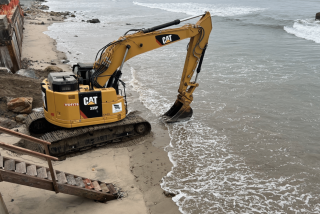Developers Slap Neighborhood Protesters With Suit
- Share via
Sharon Douglass has lived in Long Beach off and on all of her life. Michael Horrigan raised his family there. So when developers set out to put a high-rise condominium building in their neighborhood of quaint old houses, they circulated petitions, passed out flyers and called their neighbors to the fight.
Their actions did not seem unusual in a community of about 50 neighborhoods, many of them fighting to preserve their integrity.
But they were not prepared for the response from two Huntington Beach development companies that want to build the high-rise in the Zaferia neighborhood: The developers have sued Douglass, 40, who is on a fixed income, and Horrigan--a 54-year-old grandfather of four--for more than $1 million.
The suit, filed in Long Beach Superior Court, alleges that Douglass and Horrigan engaged in a conspiracy to defame the G.M. Peters Development Co. and H&P; Development, which want to build the 63-condo complex with 13,000 square feet of commercial space at 2600 Pacific Coast Highway.
A Long Beach attorney defending Douglass and Horrigan said his clients were “SLAPPed”--hit with what has come to be known as a Strategic Lawsuit Against Public Participation, a recent corporate invention to “shut grass-roots critics up.”
“These people are being sued for the crimes of speaking up at City Council and Planning Commission meetings and talking to their neighbors,” attorney Marc Allen Coleman said. “This lawsuit is an attempt to stop residents from voicing their concerns in violation of their 1st Amendment rights. It is ludicrous.”
An attorney for the developers declined to discuss the lawsuit.
In it, the developers allege that the residents made “false and fraudulent” statements, such as in the question posed in a homemade flyer full of misspellings and typos that asks: “Do you want 5 to 7 story condo’s next to single-family residents and over crodinbg (sic) of our neighborhoods?”
The lawsuit alleges that the flyer “misrepresents the actual size” of the project, which is four stories.
Also, a petition signed by 20 Zaferia neighbors says the proposed condominium would make street parking “totally intolerable,” that lights from the structure would be “like living in a parking lot,” and that the development would surely lead to an increase of “vice and drugs.”
Such arguments prompted the City Council to freeze permits for the structure, which had been approved by city planners April 5, and send the project back to the Planning Commission for study. A new hearing is pending.
The developers contend that the delay is costing them money and that the residents are guilty of “intentional interference with prospective economic advantage.” They are seeking $1 million in compensatory damages, plus unspecified punitive damages.
Even if they win the lawsuit, Horrigan and Douglass said, the court battle alone could wipe them out.
Douglass, a former postal clerk, said she is disabled with severe allergies and lives on a fixed income. Horrigan is a construction manager whose proudest financial achievement is that he has almost paid off his Molino Avenue home. Both are new to the theater of community activism, having given their Zaferia Neighborhood Assn. a name just a few weeks ago.
“When I first saw the lawsuit I was mad as hell,” Horrigan said. “But then I was a little scared. People start running around saying a million this, a million that. At my age, I am not in a position to lose my house.”
They plan to go to neighborhood groups throughout Long Beach to ask for financial help, contending that a successful SLAPP could chill the rights of anyone who signs a petition or speaks out at a Planning Commission meeting.
“An injury to one is an injury to all,” attorney Coleman said.
So common have SLAPP suits become elsewhere that legislation aiming to curb them recently won state Senate approval.
They are typically filed by developers and others who stand to suffer financial losses when citizens protest their projects. The mere filing of such a suit can hush a vocal resident.
Horrigan, for example, said he has spoken out just once since the suit was filed. Upon advice of their attorney, he and Douglass have resolved to keep fighting, however.
“We are just ordinary neighbors trying to improve our neighborhood,” Douglass said. “I don’t think we’ve done anything wrong.”
More to Read
Sign up for Essential California
The most important California stories and recommendations in your inbox every morning.
You may occasionally receive promotional content from the Los Angeles Times.













